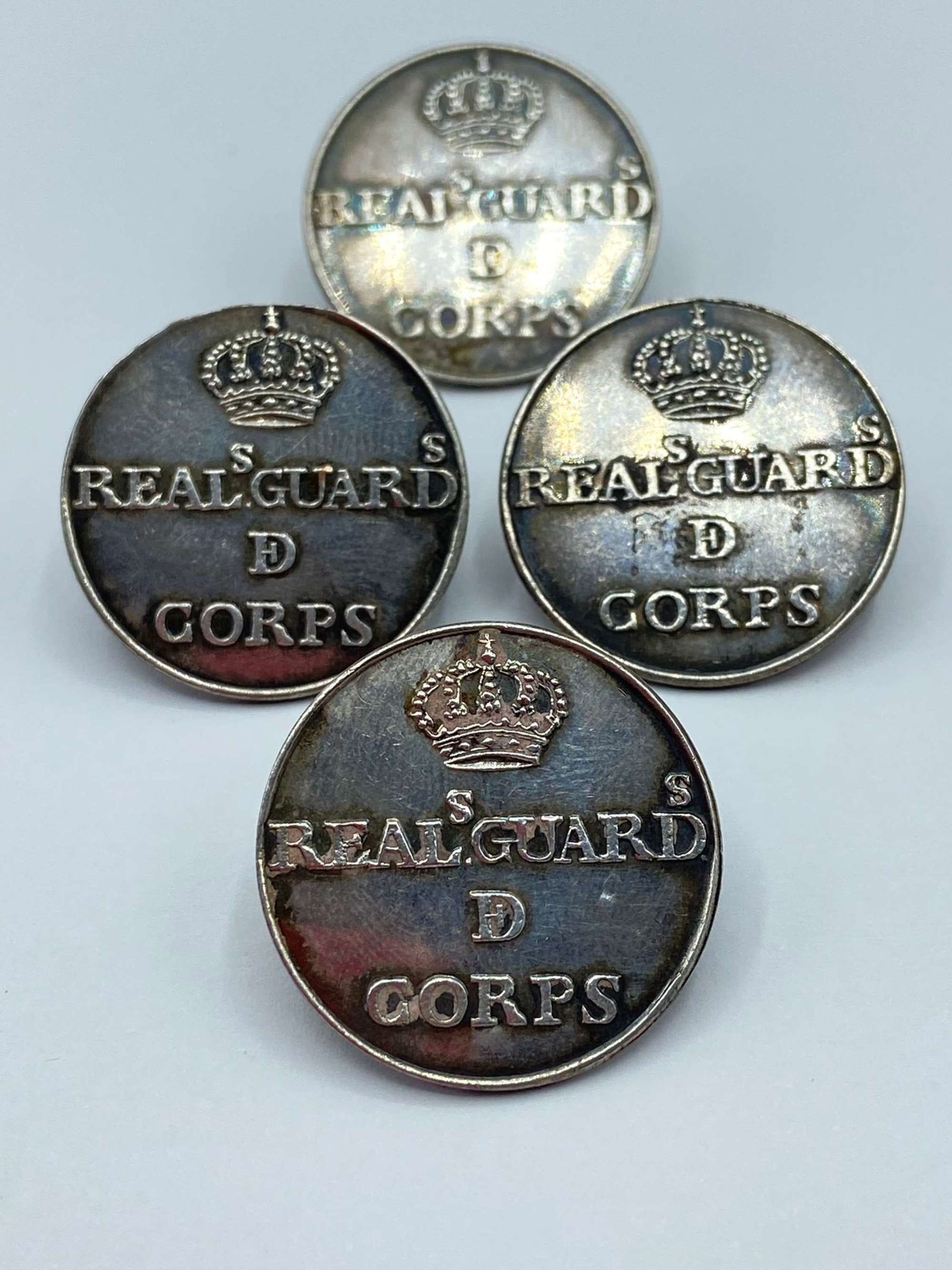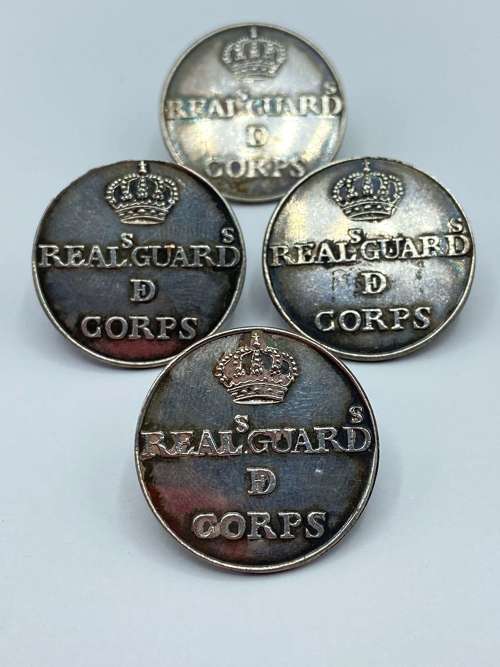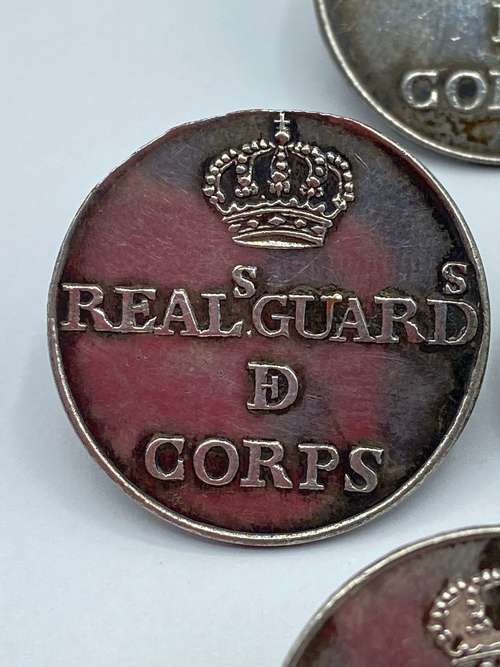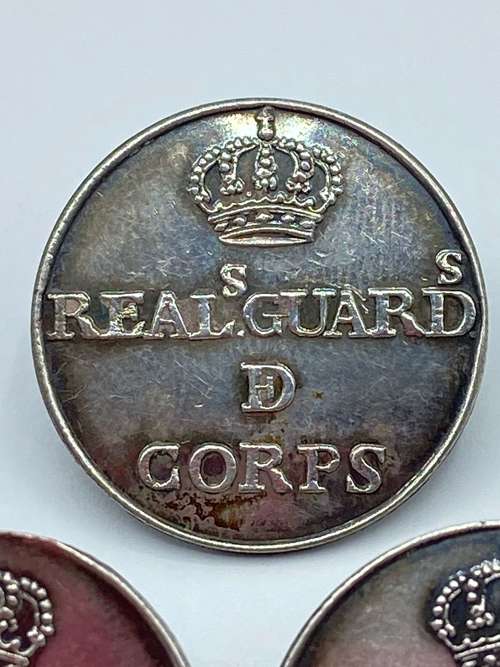1792-1802 French Revolutionary Wars Reales Guardias de Corps Buttons
Delivery Quote Request
Please fill in the form below to request a delivery quote from Atlas Antiques.
Contact Atlas Antiques
 Dorset, United Kingdom
Dorset, United Kingdom
Simply fill in the below form to get in touch with Atlas Antiques regarding this item.
About this item
For sale is a set of four Antique 1792-1802 French Revolutionary Wars Reales Guardias de Corps Buttons. These are in excellent condition, which is rare for these buttons as usually these are semi relics!
About the Guardia de corps; type of royal house troop is called a corps guard (from the French Garde du Corps). Its title indicates that it had its origin in France, dating its official name from the reign of Louis XII. The corps guard was composed of chosen people and destined to serve in the vicinity of the monarch and was generally made up of cavalry troops. Louis XIV increased the strength of his Corps Guards to form four companies of 300 horses each, and later the cash of that guard provided with a large number of privileges, privileges and prerogatives that sustained the great pride of a collectivity in whose organization did not enter categories inferior to that of army officer was raised even more in France. About the French Revolutionary wars: The French Revolutionary Wars (French: Guerres de la Révolution française) were a series of sweeping military conflicts lasting from 1792 until 1802 and resulting from the French Revolution. They pitted France against Britain, Austria, Prussia, Russia, and several other monarchies. They are divided in two periods: the War of the First Coalition (1792–1797) and the War of the Second Coalition (1798–1802). Initially confined to Europe, the fighting gradually assumed a global dimension. After a decade of constant warfare and aggressive diplomacy, France had conquered territories in the Italian Peninsula, the Low Countries and the Rhineland. French success in these conflicts ensured the spread of revolutionary principles over much of Europe. As early as 1791, the other monarchies of Europe looked with outrage at the revolution and its upheavals; and they considered whether they should intervene, either in support of King Louis XVI, to prevent the spread of revolution, or to take advantage of the chaos in France. Austria stationed significant troops on its French border and together with Prussia, issued the Declaration of Pillnitz, which threatened severe consequences should anything happen to King Louis XVI and Queen Marie Antoinette. After Austria refused to recall its troops from the French border and to back down on the perceived threat of using force, France declared war on Austria and Prussia in the spring of 1792; both countries responded with a coordinated invasion that was eventually turned back at the Battle of Valmy in September. This victory emboldened the National Convention to abolish the monarchy. A series of victories by the new French armies abruptly ended with defeat at Neerwinden in the spring of 1793. The French suffered additional defeats in the remainder of the year and these difficult times allowed the Jacobins to rise to power and impose the Reign of Terror to unify the nation. In 1794, the situation improved dramatically for the French as huge victories at Fleurus against the Austrians and at the Black Mountain against the Spanish signaled the start of a new stage in the wars. By 1795, the French had captured the Austrian Netherlands and the Dutch Republic. The French also put Spain and Prussia out of the war with the Peace of Basel. A hitherto unknown general named Napoleon Bonaparte began his first campaign in Italy in April 1796. In less than a year, French armies under Napoleon decimated the Habsburg forces and evicted them from the Italian peninsula, winning almost every battle and capturing 150,000 prisoners. With French forces marching toward Vienna, the Austrians sued for peace and agreed to the Treaty of Campo Formio, ending the First Coalition against the Republic. The War of the Second Coalition began in 1798 with the French invasion of Egypt, headed by Napoleon. The Allies took the opportunity presented by the French effort in the Middle East to regain territories lost from the First Coalition. The war began well for the Allies in Europe, where they gradually pushed the French out of Italy and invaded Switzerland – racking up victories at the battles of Magnano, Cassano, and Novi along the way. However, their efforts largely unraveled with the French victory at Zurich in September 1799, which caused Russia to drop out of the war. Meanwhile, Napoleon's forces annihilated a series of Egyptian and Ottoman armies at the battles of the Pyramids, Mount Tabor, and Abukir. These victories in Egypt further enhanced Napoleon's popularity back in France, and he returned in triumph in the autumn of 1799, although the Egyptian campaign ultimately ended in failure. Furthermore, the Royal Navy had won the Battle of the Nile in 1798, further strengthening British control of the Mediterranean and weakening the French Navy. Napoleon's arrival from Egypt led to the fall of the Directory in the Coup of 18 Brumaire, with Napoleon installing himself as Consul. Napoleon then reorganized the French army and launched a new assault against the Austrians in Italy during the spring of 1800. This brought a decisive French victory at the Battle of Marengo in June 1800, after which the Austrians withdrew from the peninsula once again. Another crushing French triumph at Hohenlinden in Bavaria forced the Austrians to seek peace for a second time, leading to the Treaty of Lunéville in 1801. With Austria and Russia out of the war, Britain found itself increasingly isolated and agreed to the Treaty of Amiens with Napoleon's government in 1802, concluding the Revolutionary Wars. However, the lingering tensions proved too difficult to contain, and the Napoleonic Wars began over a year later with the formation of the Third Coalition, continuing the series of Coalition Wars. These buttons are in excellent condition and guaranteed original or money back. These will be sent via Royal Mail special delivery and dispatched within two working days. Also happy to post internationally.Additional Information
![]() Dorset, United Kingdom
Dorset, United Kingdom
Atlas Antiques Promises You - Fresh stock weekly - Fair & affordable prices - Everything listed is original, money back guaranteed. (Unless marked fantasy or reproduction). - Fast responses and delivery's made within 2-3 working days. Atlas Antiques only handles items in terms of...



















